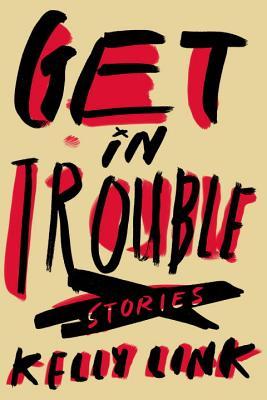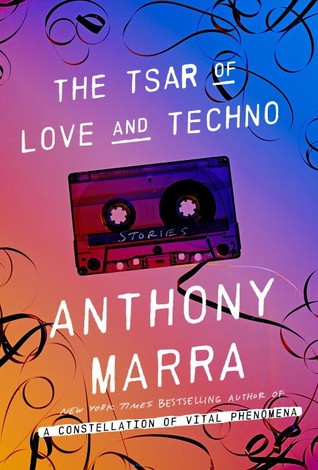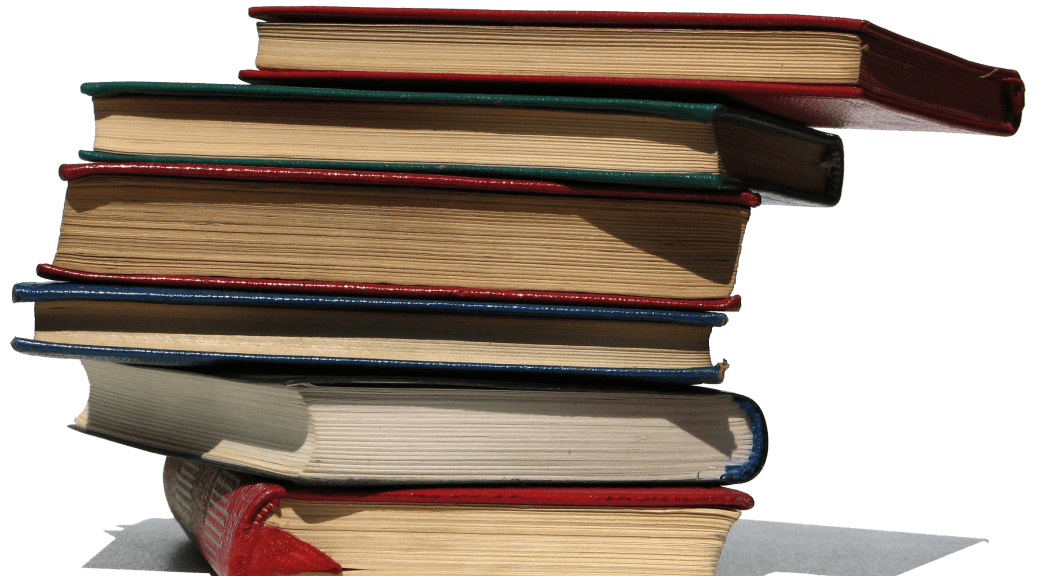Two really good story collections I read this month.

Get in Trouble by Kelly Link.
One of those books that just keeps getting recommended over and over until you think "there's no way it's actually that good, right?" Well, now I get to join the club and recommend this one. It was pretty great. For a sample of the stories in this book you can read "The New Boyfriend" or "I Can See Right Through You".

The Tsar of Love and Techno by Anthony Marra.
Yes, the title is kind of bad. But the linked stories in the book are all kind of sadly, cynically funny in a way that seemed very appropriate for the Russian setting (especially the first story "The Leopard" which is about a Soviet censor responsible for doctoring photographs who turns it into an art of his own).
Also, the Nebula nominations came out this month, so if you're looking for some sci-fi to read, there's at least a starting point. I have to get my Hugo ballot together by the end of the month, so if you have any recommendations in any of those categories let me know.


I created this!
The New Boyfriend did not turn out like I expected ... but not in a good way.
Just finishing up Command and Control, by Eric Schlosser about America's nuclear weapons and the many times we secretly came close to disaster through poor storage and other accidents. It was very, very interesting.
I have that sitting on my shelf, waiting to be read.
At some point I need to get my hands on your roommate's latest. Other books keep intervening, but it's on my list.
My parents have really enjoyed it.
Hmm, I forgot about that guy. I liked his first couple.
I requested it from the library based on your recommendation. It sounds like it would tie in well with some other reading I've been doing recently.
Does that reading include third degree or severe or flash burns over all or some of the body?
(sorry, couldn't resist!)
Complete with thermal heat waves!
I just finished Prisoners of Geography about how geographical features have shaped modern events and foreign policy. For instance, why Russia has tried so hard for a warm water port, and what lacking that may mean for their overall ability to project their power. As a history and geography buff, it was a very good read.
Have you read The Plantation of Ulster? I'm slogging through the early years in the first pages right now. I'm learning a lot of the early politics, but reading it tends to put me to sleep.
I have been immersed in The Great Gatsby this month trying to find effective ways to interest 11th graders enough to actually read it.
Not a book, but the rest of my spare time has been invested in Dan Carlin's podcast series on WWI. I heard about this series a year or so ago (probably here...) but have been intimidated by the running times of each show. It's amazing how quickly three hours pass....
I stopped listening to Carlin. Just too long and rambly.
I've recently started listening to Revolutions. Much more manageable runtimes, and seems a bit more scripted and polished.
I listened to some of his stuff, and I basically agree. He has some interesting material, but could probably benefit from an editor or something.
Read The Moor's Account by Laila Lalami, an interesting take on early American expeditions by the Spanish through the lens of an Arabic slave.
I read King Lear so I could read Fool. I remember seeing King Lear at the Guthrie while in high school. My theater cred is so very, very lacking, but I will remember forever Richard Ooms as Lear saying and spraying his way through the production.
Fool by Christopher Moore - King Lear as told through the Fool's eyes, but with a generous portion of shagging, snogging and wanking, plus a slightly less tragic end. It seemed a bit rougher than his sequel, Serpent of Venice, which I preferred.
"The Judgement" by Franz Kafka. Short story. I like Kafka.
Invisible Man by Ralph Ellison - I've owned this one for quite a while as part of a great books collection, but never pulled it off the shelf. I grew up and was educated in and made my adult home in a rather white part of a pretty white state. I may have thought that I'd feel bad or wouldn't be drawn into a novel that about a black man's experience in the 1930s. Knowing it was a book on a pedestal, I probably expected something preachy. It turns out this was a really, really good book. (I wonder what other gems I have on the shelf that I've been avoiding, thinking they're something they're not.) I was definitely drawn, and read fast. I'd recommend it to those that haven't read it. Even so, I took a trip to Jackson, MS last month and felt rather self-conscious pulling it out on the plane...race is complicated...I'm not entirely sure why.
Yes! That was an excellent show--and highly memorable. Especially since I was sitting quite close to the front.
I love finding out these little experiences I have in common with people here--seeing a certain play at the Guthrie, being at the 1987 post-WS parade, seeing the same exhibit at the Walker, etc.
I like Kafka
Does "like" really seem like the right word?
Note: I used to hate Kafka, because I didn't think the world really operated that way. Now I know better, and I respect the crap out of Kafka.
I appreciate Kafka? I don't like the world he portrays, but I like how he does it.
Going back and reading the introduction to Moby-Dick after I finished, I learned that Melville was reading or re-reading King Lear while writing Moby-Dick, so now I'm kind of interested to go back and read that.
Good to know about Invisible Man, I would say that I've been avoiding it for similar reasons.
I read Invisible Man a few years ago now. It was certainly a fast read, and it covered a lot of ground, but I never quite connected with the character. I think that's kind of on purpose, and a product of the ground being covered in the book, and the fairly anonymous nature of the character. Anyway, I'd echo that it's a worthy read, but I didn't like it as much as ZG did. Some of the scenes have really stuck with me over the past couple years though, so there's that.
In a college class, I read both Invisible Man and Native Son. My memory is a bit fuzzy, but I remember the professor contrasting the two books and strongly preferring Invisible Man for clearly expressing Ellison's point of view without merely being a vehicle for getting across that point.
I also remember that Ellison never finished his second novel, though he apparently wrote thousands of pages. Here's a Washington Post article with more info about it.
I read Invisible Man in high school, and absolutely loved it. It touched me and affected me in a way that very few books ever have before or since. Unfortunately it's now been long enough that I remember very little of the book, but still have a distinct memory of the feelings it instilled in me. I would say I should re-read it, but considering I never manage to find the time to read any books at all, I don't see myself finding time for a repeat.
I had the good fortune to have Invisible Man, Native Son, and Nathan McCall's Makes Me Wanna Holler: A Young Black Man in America put in my hands by a wonderful teacher in high school. Given where I grew up, those were very eye-opening and their power – if not all the particulars of the stories – has stuck with me. I actually went so far as to email McCall, presumably at school since we wouldn't have had dial-up at home yet, and he was very kind in his reply to a young, white kid from small town Minnesota.
I read (in translation) almost all of Kafka's published works (and some auf Deutsch, but that was a serious struggle). Some of the shorter stuff is just fantastic. Look for a collection called I am a memory come alive .
Deadline, by John Sanford - a neighbor lent this to me. I've read a few (okay, maybe only one) of Sanford's Prey/Lucas Davenport series and found it to be alright. This one - a Virgil Flowers novel - was pretty formulaic. I won't read any more of these.
The Cat from Hué: A Vietnam War Story, by John Laurence - Powerful and eye-opening; Laurence did television reporting from Vietnam for CBS over three different periods. I'm about 80% done - just reached the beginning of Laurence's third period in Vietnam: 1970. His experiences and observations from the ground - in actual battles and time spent in the field and in Saigon - result in a slow development/maturation of his anti-war position and perhaps the pinnacle of his broadcast career, the documentary: The World of Charlie Company.
Picked up Speaker for the Dead, by Orson Scott Card - a couple years ago, I finally read Ender's Game due in no small part to all of the support it received in the basement's reading room, and this one also seems to be highly recommended. Through 25 pages, Speaker feels as though it will live up to the hype.
I attended an event last night at the Humphrey School of Public Affairs as a member of the school's Policy Fellows program. Thomas Friedman chatted with us for more than an hour about his experiences and perspectives on politics, civic engagement, public policy, patriotism, etc. ... it was really compelling. I've read his columns, but not any of his books. I stopped at Half Priced Books on the way home and picked up The World Is Flat: A Brief History of the Twenty-first Century and The Lexus and the Olive Tree. I'm very much looking forward to seeing if they resonate as well as he did as a speaker.
I may ask to borrow Speaker for the Dead when you're done.
You'll like it.
Verrrry different from Ender's Game. Excellent, but different.
I have it as well if you want it sooner.
Thanks for the offer. I should work on IJ for a while, but I'll let you know. EIther way, it's definitely on my to-read list.
Laurence's interview with a bunch of Marines under siege at Khe Sahn is an unshakeable piece of television journalism. Laurence asks the Marines what they do to pass the time between incoming rocket & artillery barrages. Play cards and sing at night is the reply from one guitar-holding Marine, who starts strumming "Where Have All the Flowers Gone?" The camera pans around the group of filthy, shellshocked young men as they sing in unison.
That scene is recounted in both The Cat from Hué and Michael Herr's Dispatches.
I made 0 progress on Infinite Jest. I have been reading the Gospels, a devotional (Lent) and a book on evolution and God. Next month I'll share, when it's finished. Early preview: it's good.
I finished Moby-Dick, and I quite liked it overall. Some of the chapters missed the mark for me (wasn't a huge fan of reading about the dual nature of the color white and I think I get what Melville was trying to do with his whale classification chapter, but it still fell short), but the rest of it made up for it. I thought I might not like the technical bits about whaling, but the details usually came up later when Melville decided to advance the plot some more, so the time spent on the technical descriptions seemed worth it. It reminded me a lot of Tarantino's films, but I'm not entirely convinced that's a great analogy. From a big picture perspective, I was reminded of Citizen Kane, There Will Be Blood, Aquirre, Wrath of God, and Apocalypse Now (so probably Heart of Darkness, but I haven't read that).
My three favorite chapters were:
LX: The Line ("All men live enveloped in whale-lines. All are born with halters around their neck; but it is only when caught in the swift, sudden turn of death that mortals realise the silent, subtle, ever-present perils of life. And if you be a philosopher, though seated in the whale-boat, you would not at heart feel one whit more of terror than though seated before your evening fire with a poker, and not a harpoon by your side." I don't think Melville would really have been into sabermetrics.)
XCVI: The Try-Works ("Look not too long in the face of the fire, O man! Never dream with thy hand on the helm!")
CV: Does the Whale's Magnitude Diminish?--Will He Perish? (In which Melville attempts to argue, essentially, that humans can't possibly kill all the whales (as they nearly killed off the buffalo) because the whales could always retreat to the poles. I wonder what he would have thought of our destructive capabilities after Hiroshima and Nagasaki.)
Now I'm reading Atul Gawande's Being Mortal, on the recommendation of my wife.
I don't think Melville would really have been into sabermetrics.
*shakes harpoon* "Get off my longboat!"
Ubes: I've found your next read. A picture book about two frogs named "Dude" and "Bro" that somehow weaves Moby-Dick into the storyline. Lest you doubt the author's credentials, he won the 2015 Newbery Award. You can find a review here.
I hit page 300 of IJ on this bus this morning, so that's exciting. I think I finally started getting some momentum around page 200 and since then I've been eager to keep reading and find out what happens next. Some of the sections are longer now, so I'm not jumping between characters/time periods/locations quite as frequently, and Wallace isn't introducing more new characters with separate storylines (at least not at the moment; far be it for me to attempt to anticipate what might be yet to come).
I just hit endnote 110, however, and that thing is a monster. It may take me several more bus rides to make it all the way through.*
Thanks for the spoiler. Give me a goal to reach, which should help my motivation.
I really really really miss my old bus commute.
And . . . I've finally reached the end of note 110. It's been a busy week and circumstances have conspired against me taking the bus as often as usual, but still!
My sister-in-law gifted me a copy of her brother's new book Divorcees, Barmaids, and Cranks: The 1897 Red River Valley Baseball League. I haven't read too far in, but it seems interesting so far -- pretty well researched, at the very least.